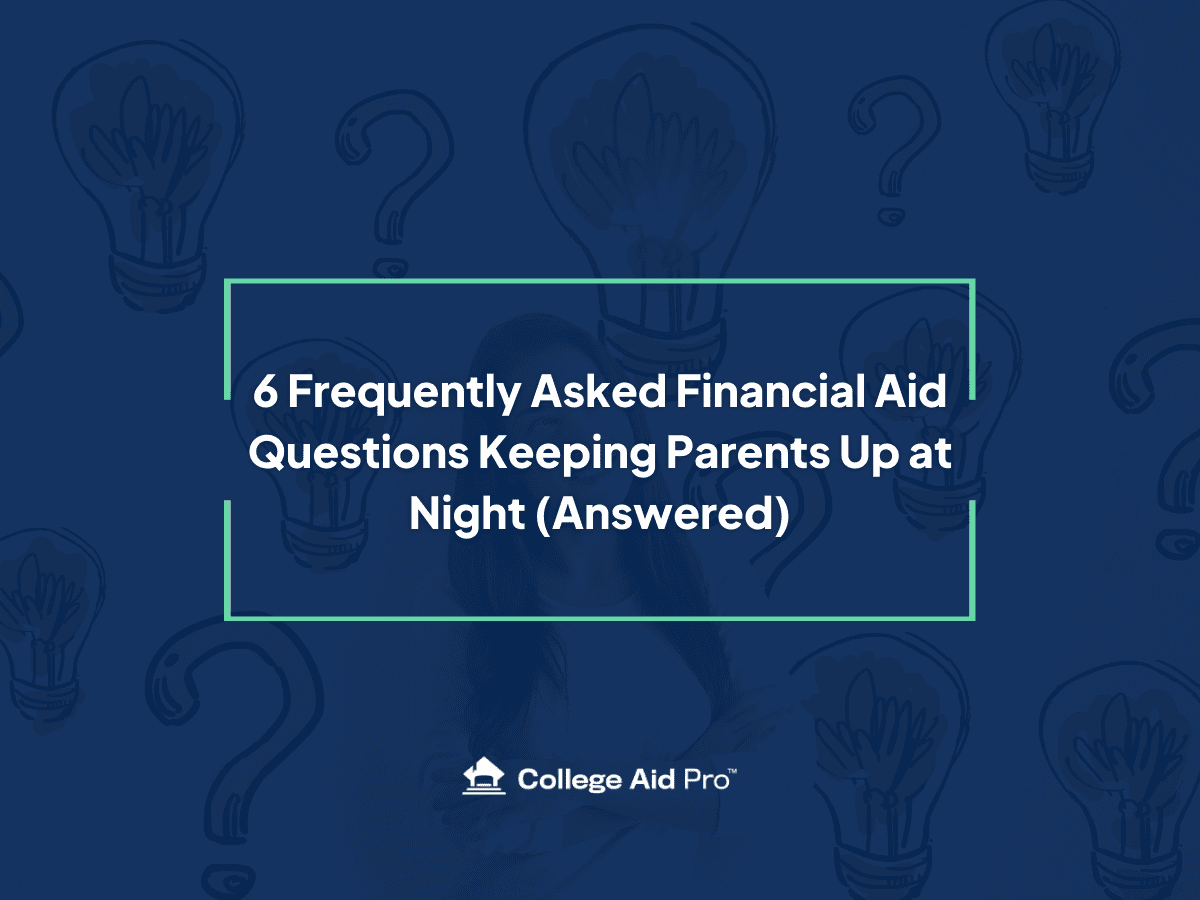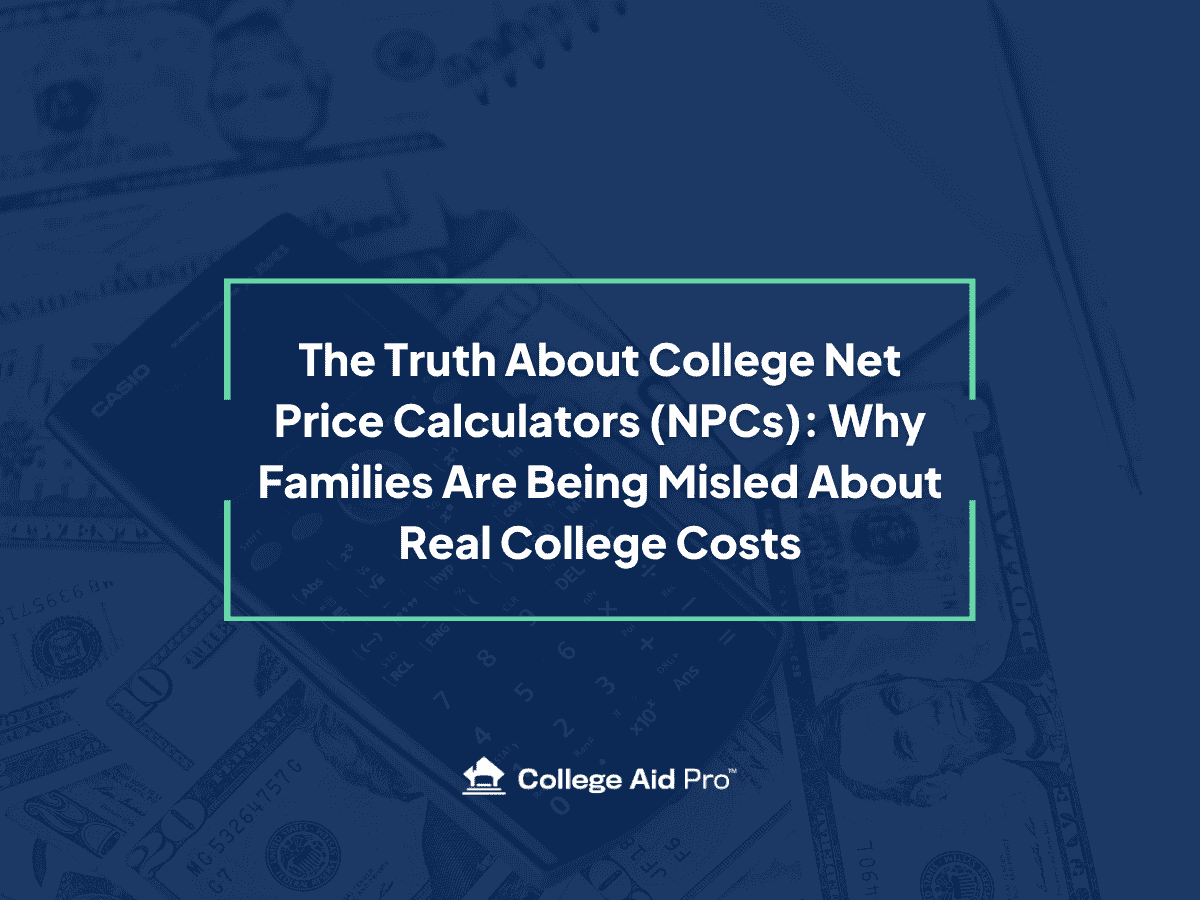“The great aim of education is not knowledge but action.” – Herbert Spencer
We created the College Aid Pro platform first and foremost to help fill a massive knowledge gap that we saw in the general public’s understanding of the financial aid system and how to effectively plan for and pay for higher education. Providing this education, however, was only half the battle. To us, the real value in what we provide is not the information itself, but what we enable people to do with it to improve the outcomes of their decisions.
While we empower better decision making throughout the college shopping process with things like better school selection and effective form filing, the most impactful value we provide is helping families maximize the amount of financial aid they receive. Specifically, the award letter appeals process is where we shine and where all the useful information we provide is put to the test.
Before explaining how we increase the likelihood of a successful appeal, let’s cover some background on a part of the college application process that is still widely unknown to most families: the financial aid appeals process.
Let’s start with the name: “appealing for reconsideration.” Colleges and financial aid offices are sensitive to the nomenclature attached to this process and sticking to the script is part of the expected etiquette. The naming convention is an interesting and telling part of the admissions dance. For instance, schools really do not like when people refer to this process as a “negotiation” even though by definition it certainly is one.
Why so sensitive? Well, by calling it an “appeal”, the school is setting the tone that they hold all the power and admitted students should realize they are coming hat-in-hand to solicit favor from a hopefully benevolent benefactor. Adamantly having it called an “appeal” may seem inconsequential to many, but it is an important, if subtle, part of the process of establishing the power dynamic in the colleges’ favor.
Now, one cannot hold it against colleges and universities for employing this strategy. This positioning approach with potential students has been extremely effective and is part of how higher education in the U.S. has been built over the past 60 years.
As Scott Galloway has accurately railed over the past several years, colleges and universities are more about selling premium brand names than they are about providing superior educational services. Establishing themselves as elite and exclusive brands is fundamental to the college’s continued, long-term success and helps them justify skyrocketing tuition costs.
But save for some extremely competitive colleges (who have completely aced this marketing and branding strategy), the appeals process is a negotiation. While we recommend students and families play by the rules and call it an appeal, recognizing it as a negotiation allows us to approach the discussion on a more even footing, which will increase the odds of getting more aid.
Simply put, students and families have more say in this process than they realize and we are here to show you how to leverage everything at your disposal.
For some people reading this, you may be thinking to yourself, “We are just so happy our kid got in. Shouldn’t we just be grateful for that and accept whatever financial aid package was given?” If this is you, you are not alone. This is exactly the sentiment colleges want you to feel and it is the main reason why the appeals process is not as utilized as it should be.
Again, this is the power dynamic colleges are actively trying to establish, but there are some key things to remember and put your mind at ease as you think about pursuing a potential appeal:
- The college will not rescind the acceptance because you appeal
- Most colleges treat potential students like airlines treat potential passengers – they are trying to get as much money out of each individual as possible without scaring you into going elsewhere
So while it’s human nature to feel a bit uncomfortable asking for more money, it will be alright. Treat it like you would shopping for anything else – car, house, vacation, whatever. You’re looking for the best, most valuable deal you can get and there is nothing wrong with that.
It is worth noting as well that when you appeal you are not just asking for more need-based aid. A properly executed appeal can be just as successful in getting more merit-based scholarships, which the admissions office may have more flexibility in handing out.
To add yet another wrinkle to the equation, need-based aid is typically managed by the financial aid office and merit-based aid is handled by admissions. So it is not just what you say and how you say it, but also who you say it to that’s important.
Now with all of this said, we are not advocating or suggesting every financial aid award letter should be appealed. Quite the contrary. Strategically and selectively approaching the appeals process will increase your odds of success.
So what makes a good appeal candidate? Getting into all of the details of the student and family situation is ideal, of course, but there are a few major buckets to consider when evaluating a case for appeal:
- Amount Awarded
-
-
- Award amount is less than what we would expect based on what similar applicants typically receive and what the school claims to award.
-
- Type of Institution
-
-
- Public or private. FAFSA or CSS Profile. The type of college you are applying to matters when considering an appeal.
-
- Family Considerations
-
-
- If your family considerations are nuanced (i.e. multiple kids in school or the parents are divorced or separated), then a strong case can be made that your situation deserves further evaluation by the school.
-
- Unique Circumstances
-
- Some aspects of your situation may not be obvious in the typical application forms and highlighting these can make an appeal case stronger.
- These types of circumstances include:
- Own your own business?
- Has your student received better offers at other colleges?
- Did you have a rollover retirement account in the base income year?
- Do you have any underfunded retirement accounts?
- Do you have a Medical & Dental account?
- Have you had any recent one-time capital gains?
- Have you experienced a job change in the past 2 years?
- Any other dependents (other than children) reported on your taxes?
- Did your student attend a private high school?
As you can see, there is a lot to consider when approaching a potential appeal. With the average number of applications per student continuing to rise, the time and effort to decide when to appeal can be overwhelming. We totally get that and we have designed our Appeals Evaluation module to do much of the heavy lifting for you.
How does it work?
- First, create a free account and let us know a bit about your child and family situation.
- Next, upload your financial aid award letters and we will auto-translate them for you so you can see them all on an apples-to-apples basis.
- Lastly, we will run the results through our Awards Analyzer to help discern which awards are good candidates to appeal and which ones are not likely worth the time.
After doing this, you should be in a great position to choose which awards to appeal. The appeals process can vary by school, but it typically entails a letter from the student and/or parent at a minimum. The intent of the letter is to explain the reason(s) why the aid application deserves a second look.
For more information on the appeals process, check out these articles here and here. We’ve also got a great video that breaks down appealing as well. You can find that here.
If helpful, our team of college planning and financial aid experts are available to discuss your case in detail and help put you in the best position possible for a successful appeal.
You can create your free account here. To upgrade your account to access all our features and the full version of our software the Scholar plan is for you. If you’d like to add a one on one hour consult with one of our experts to your plan, choose the Valedictorian plan.
In closing, we first and foremost want to congratulate you or your student on getting accepted to college! A lot of hard work and determination was required to get here, no doubt. But do not let all that hard work stop now just because you got in. The years of simply getting in and being grateful for any financial aid at all are over. Please leverage our platform and team to ensure you get the best deal possible.
Good luck!



